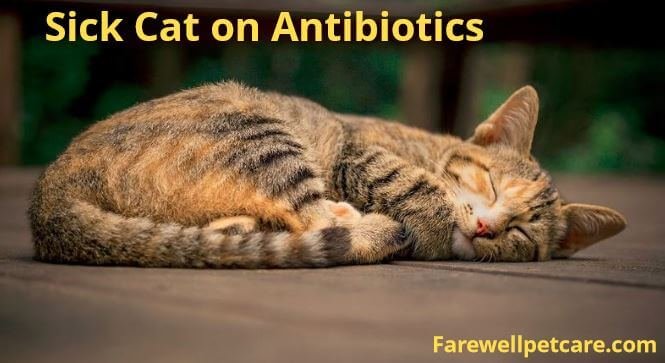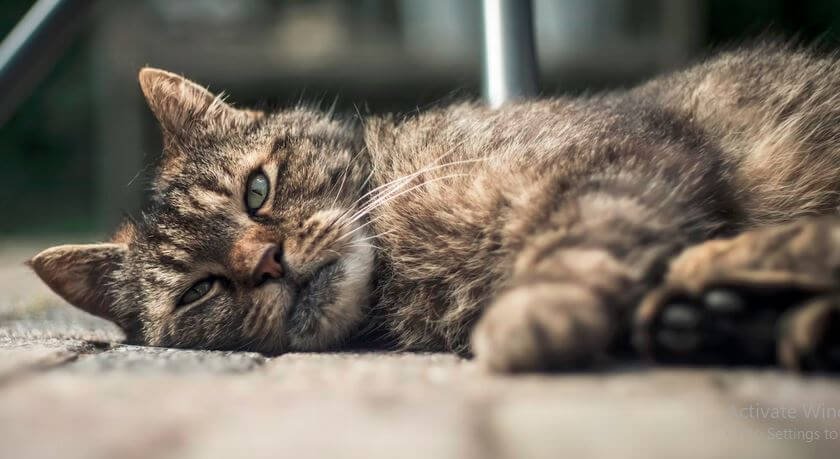Antibiotics remain the most effective medications for bacterial infections in pets like cats. These drugs stop bacterial buildup and prevent future infections. However, a cat on antibiotics not eating is not uncommon, and pet parents often wonder what causes this situation.
A cat on antibiotics not eating is a situation that can arise due to the side effects of antibiotics given to the cat, the underlying infection you are treating, stress and anxiety, unpleasant administration method of the antibiotics, allergic reactions in some cats, and change of diet.
Read on to learn the causes of your cat not eating while on antibiotics, why it happens, and how to remedy the situation to get your lovely feline back to eating.
5 Causes and Remedies of a Cat on Antibiotics Not Eating
Here are the causes to consider when your cat suddenly stops eating after a dose of an antibiotic;
1. Antibiotic Side Effects
Gastrointestinal upsets as a result of antibiotics can lead to appetite loss.
A cat experiencing gastrointestinal disturbances may feel nausea, vomiting, and diarrhea. Altogether, these conditions lead to reduced or complete appetite loss because of increased discomfort.
Additionally, the metallic taste of some antibiotics like amoxicillin in the mouth can deter your cat from eating. In general, some antibiotics change the sense of taste, making your cat lose appetite and interest in food.
If you mix liquid antibiotics with food, a taste alteration could occur. Often, the taste is unpalatable, resulting in your cat’s decreased desire for food.
In some instances, these medications wipe off gram-positive bacteria in the gut. The outcome is a disrupted balance of the beneficial bacteria. This can cause stomach upsets that trigger a low interest in food.
Your cat may refuse to eat for two days after the medication. So, you can imagine an extra two days on top of a lengthy two weeks of antibiotics prescription—that’s a big problem for your cat.
Remedies:
Talk to your veterinarian to know the possible side effects of the drug your cat takes. The vet will observe the extent of the situation and could recommend the following:
- Adjusting the dosage
- Changing the medication
- Providing palliative care, such as parental feeding to manage side effects
In addition, give your cat her favorite food. The food should be both nutritious and palatable to encourage feeding.
Find Out: Do Antibiotics Make Cats Sleepy? 4 Things to Do
2. Stress

Stress in cats receiving medications is not uncommon. The first trigger of stress is the infection itself. Usually, these infections cause general discomfort due to physical effects.
For instance, inflammation or pain could strain your cat. On top of that, there’s that stress from antibiotic medications. In most cases, you’ll see your cat drooling if inflammation is the cause of loss in appetite.
Whether the infection or medications induce stress, both aspects negatively affect your cat’s appetite, making the cat lose interest in food.
Remedies:
As usual, call your veterinarian for guidance. Other than that, you should ensure the following;
- Provide the cat with her favorite food. It will be a good step forward even if she doesn’t eat a good chunk of the food.
- Try providing different food flavors and textures or shapes.
- Depending on her pain, the vet may recommend painkillers to reduce the discomfort making her refuse to eat.
All said, make sure you don’t discontinue the medication. Some pet parents may attempt to stop further medication before the prescription days are over due to their pet’s discomfort, pain, and distress.
Doing this could create an environment for more powerful bacterial strains. Basically, the current bacteria develop resistance to antibiotics.
So, if you think things are not working well, call your vet for further help.
3. Underlying Disease
Generally, one of the most common symptoms of infections is loss of appetite. Besides the loss of appetite, many changes happen once the infection invades specific organs in a cat’s body.
Therefore, if appetite loss is due to an underlying infection, you may also see the following general symptoms;
- Your cat shows lethargy
- Excessive drooling
- Weight loss
- Diarrhea
- Vomiting
- Behavior change
- Bad breath
- Dehydration
- Fever
These symptoms can be intense, causing discomfort and pain – leading to a sudden decline or refusal to eat.
Otherwise, simply losing appetite alone cannot be a sign enough to conclude that a cat has another underlying disease. Sometimes, loss of appetite may be psychological. You should closely monitor your cat to see if there are physical or behavioral symptoms of an illness.
Remedies:
- Adjust medication: Already your cat is on an antibiotic medication prescribed by a veterinarian. However, the situation may require the vet to review the meds and adjust accordingly. The vet will prescribe specific medications if another disease is found besides the bacterial infection. Follow the vet’s prescription strictly and inform them of the progress.
- Rehydrate your cat: Fluid therapy is essential when the cat is not drinking enough water. Help your cat drink plenty of water to counter the effects of vomiting and high fever.
- Help feed your cat: You can do tube feeding to help your cat eat something. The food should be in liquid form or softened for easy ingestion. Remember not to force her if she doesn’t want.
4. Method of Administering the Antibiotics
Sometimes drug administration mode could affect your pet’s interest in food. For example, mixing the food with an antibiotic can lower its palatability.
Pills or tablets can choke the animal if administered wrongly, causing panic and stress. Similarly, if you administer the medications forcefully or struggle, the cat will likely relate the experience to taking food.
Hence, unpleasant administration methods can contribute to your cat not eating or eating less than expected.
Remedies:
- Change the method of administering drugs if the previous one didn’t work.
- Also, administer medicines carefully and gently to reduce the stress associated with the process.
- You can use positive reinforcement like treats or a favorite toy to build cooperation with your cat.
- Administer the medicine in a quiet place without distractions.
- Give your pet enough water after administering the pills or tablets.
- You can also ask for help from someone who can help give the medicine while you hold the cat.
Don’t forget to consult with your vet if you experience any confusion.
5. Allergic Reactions
Some cats have allergic reactions when put on certain antibiotic medications like tetracycline. Your cat’s situation can worsen when she has other conditions, such as liver or kidney diseases.
Loss of appetite is one of the most common symptoms you will see in a cat that’s suffering from antibiotic allergies.
When allergic reactions occur, you will also notice the following symptoms;
- Skin rash
- Facial swelling
- Fever
- Difficulty breathing
Remedies:
Reach out to your cat’s veterinarian immediately after you notice the symptoms. The vet should also prescribe mild antibiotics such as amoxicillin if your cat cannot withstand the effects of stronger ones like penicillin and tetracycline.
Feed your cat food that has been recommended only by the veterinarian.
Cat Vomiting After Antibiotic Injection
If your cat is vomiting after an antibiotic injection, it could be due to adverse reactions in her body. It indicates your kitty’s intolerance to the given medication.
Usually, the vomiting happens because of stomach upsets. Antibiotic injections don’t subside from your cat’s system immediately. The residues may stay in the kitty for a few days, even after completing medication.
Here are possible causes of vomiting after antibiotic injection;
- Incorrect dosage
- Allergic reaction in the cat’s body
- Irritation in the gut
- Incompatible medications
- Your cat probably has an underlying condition you are yet to know
Nonetheless, the vomiting should not persist under your watch as it puts your cat at risk of dehydration.
Hence, you need to call your veterinarian immediately to guide you on what you should do to stop vomiting.
How Long Should I Wait If My Cat Is Not Eating?

You should wait for about 24 hours if your cat is not eating. Beyond this period, you should call your veterinarian for a checkup.
That said, the kitty could be sick, and not eating for a prolonged period is just one of the symptoms of a sickness.
You must call the vet right away after 24 hours. The vet will check for disease symptoms other than refusing to eat. Moreover, a medical test may be necessary if there seem to be no accompanying physical signs.
Nevertheless, 24 hours without eating won’t cause permanent harm to your cat’s health, according to Dr. Sara Ochoa, a veterinary consultant at Whitehouse Veterinary Hospital. If the condition persists for 2-3 days, the body begins to break down excess body fats – and some of them build up in the cat’s liver, leading to hepatic lipidosis.
How Long Can a Cat Refuse to Eat?
A cat can refuse to eat for two weeks as long she’s taking water. However, staying without eating has dire consequences for the cat. This is because she’s going without the essential nutrients needed for strong body immunity.
You don’t want to see her go all that way without eating. That’s why you should inform your veterinarian right from the moment she goes 24 hours without food.
Otherwise, the body will convert fat into energy, damaging the liver. It’s challenging to help a cat that has undergone starvation recover. The situation is even more challenging if the cat is not drinking enough water.
Liver failure means that your beloved cat will soon die. This is the main reason to seek the help of a veterinarian early when the cat stops eating.
Final Thoughts
In the delicate balance of feline health, the scenario of a cat on antibiotics not eating can be a cause for concern.
As we’ve explored the potential causes and remedies, it becomes evident that our feline companions rely on us not only for their medical care but also for the emotional support and nurturing they need during such challenging times.
Remember, a cat’s refusal to eat can be a silent cry for help, signaling discomfort or anxiety. While these remedies can offer assistance, it’s crucial to maintain a vigilant eye on your pet’s well-being, consult your veterinarian promptly, and provide the warmth and love that can aid their recovery.
Our cats may not speak, but they communicate their needs in subtle ways, and it’s our responsibility to listen and respond with compassion.

